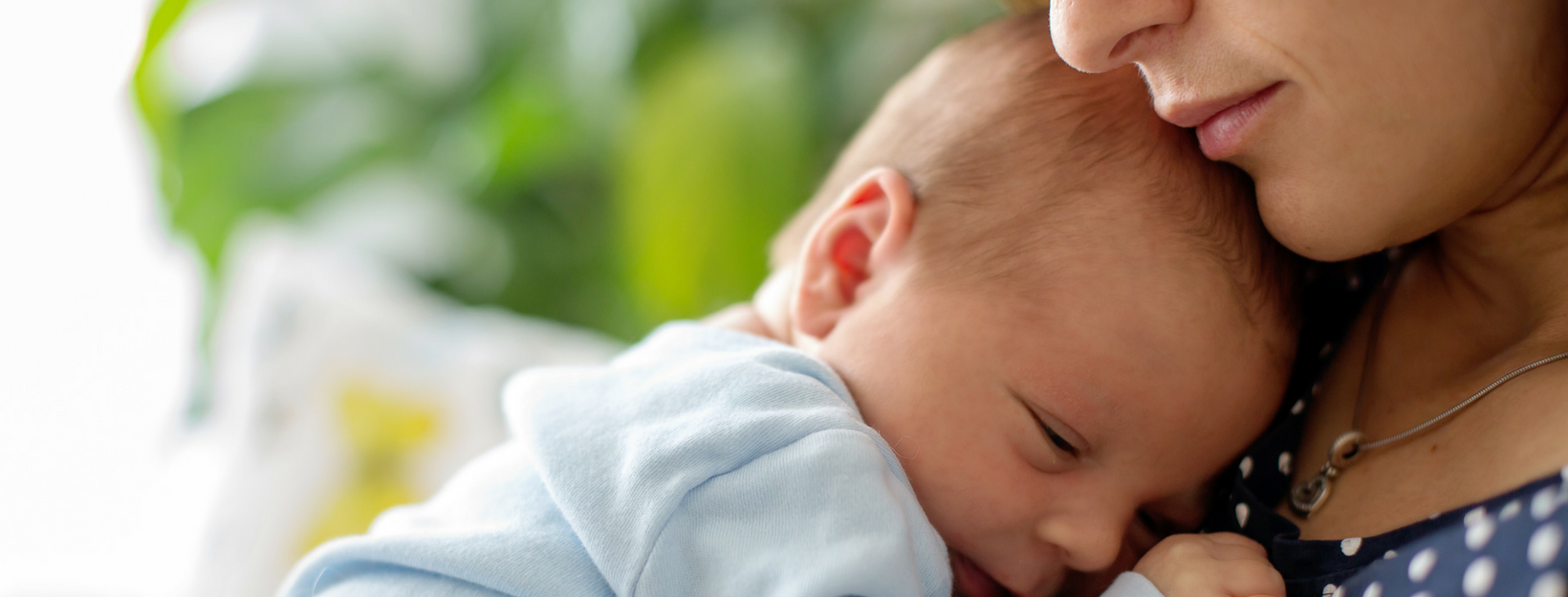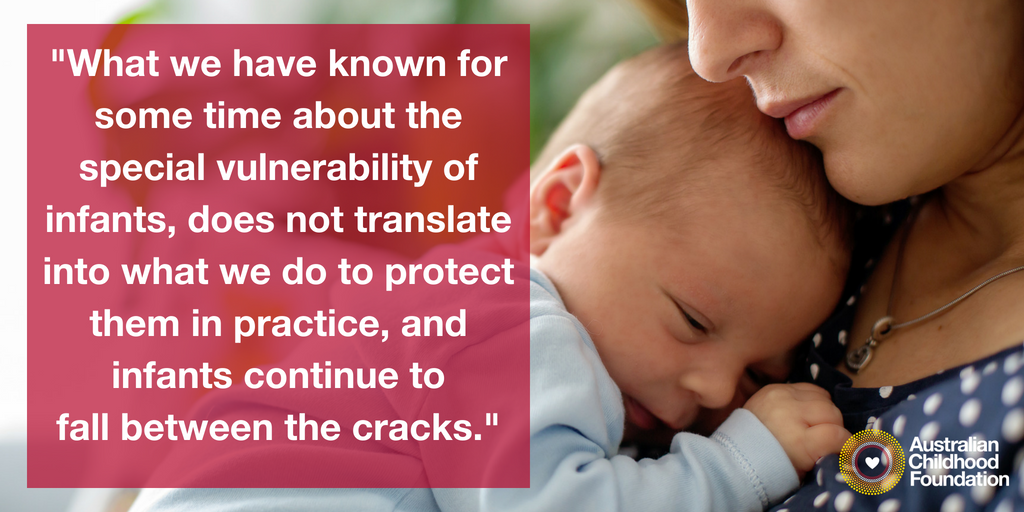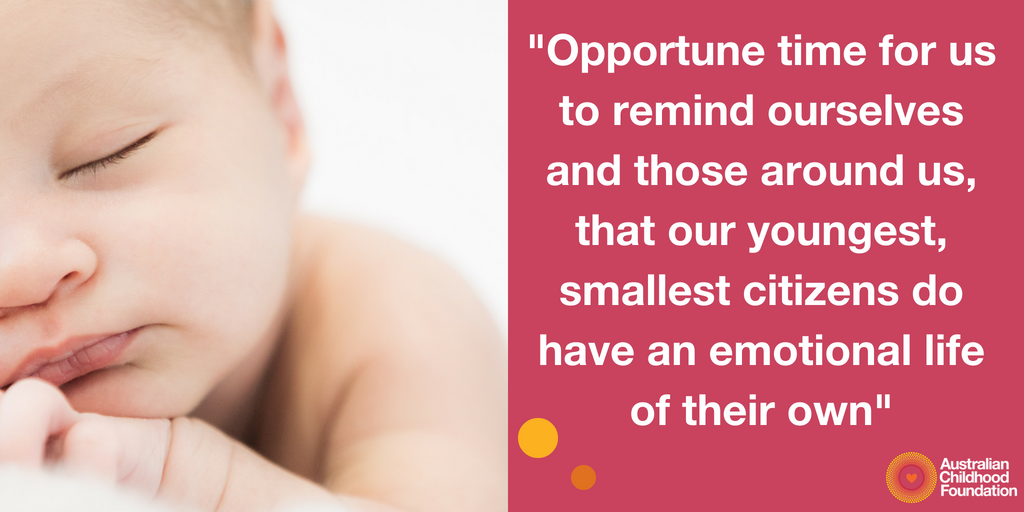
Infant Mental Health Awareness Week
This article was authored by Jeanette Miller, Senior Consultant
in the Parenting and Early Years Program at the Australian Childhood Foundation
As one of the Family Violence Demonstration Projects currently operating in Victoria, we provide weekly therapeutic groups for mothers and their children from birth to six years. To cater for the needs of children in this age range, we provide three different groups: one for babies, another for toddlers and another for children aged 3-6 years…and at the beginning of every term, we’ve come to expect that it will be most difficult to recruit families into the babies’ group, and that the babies’ group will be the smallest. Interesting! Why is that?
Despite statistics showing that of all children, infants are over-represented in substantiated child abuse data; that violent households have a significantly higher proportion of children aged five years and under; that pregnancy is a time of increased risk of violence for women (click here for more info) and that exposure to violence in utero can have intergenerational epigenetic effects (click here for more info) what we have known for some time about the special vulnerability of infants, does not translate into what we do to protect them in practice, and infants continue to fall between the cracks.
 Children who live in homes characterised by parental violence, ‘have been called the ‘silent’, ‘forgotten’, ‘unintended’, ‘invisible’ and/or ‘secondary’ victims of domestic violence ( Edleson 1999; Kovacs & Tomison 2003) and in the case of infants, that seems to be amplified. The word infant is derived from the Latin, meaning without speech, and we generally describe as infants, those children in the first three years of life, who are not yet proficient users of adult language. But to ignore or minimise the voice and needs of infants simply because they communicate differently from us, is as disrespectful as marginalising people with disabilities or those who speak languages other than our own. Parents often prioritise seeking help for their older children whose behaviour is more obvious/noticeable/problematic, whose voices are louder and language more easily understood….but it’s the quiet ones you need to watch! How many times have you heard a foster parent caring for a baby, describe him as ‘placid’ or ‘easy’? There may be some traumatised infants who have a cruisy temperament, but it is crucial that adults caring for our most damaged infants know the difference between a placid baby and a dissociated baby who has shut down… because dissociation is the nervous system’s last ditch stand, when all attempts to fight or flee have failed. In this death-feigning state, infants are much more highly stressed than those who are screaming or lashing out.
Children who live in homes characterised by parental violence, ‘have been called the ‘silent’, ‘forgotten’, ‘unintended’, ‘invisible’ and/or ‘secondary’ victims of domestic violence ( Edleson 1999; Kovacs & Tomison 2003) and in the case of infants, that seems to be amplified. The word infant is derived from the Latin, meaning without speech, and we generally describe as infants, those children in the first three years of life, who are not yet proficient users of adult language. But to ignore or minimise the voice and needs of infants simply because they communicate differently from us, is as disrespectful as marginalising people with disabilities or those who speak languages other than our own. Parents often prioritise seeking help for their older children whose behaviour is more obvious/noticeable/problematic, whose voices are louder and language more easily understood….but it’s the quiet ones you need to watch! How many times have you heard a foster parent caring for a baby, describe him as ‘placid’ or ‘easy’? There may be some traumatised infants who have a cruisy temperament, but it is crucial that adults caring for our most damaged infants know the difference between a placid baby and a dissociated baby who has shut down… because dissociation is the nervous system’s last ditch stand, when all attempts to fight or flee have failed. In this death-feigning state, infants are much more highly stressed than those who are screaming or lashing out.
Through modelling, and with gentle encouragement, we can support mothers to keep babies in mind, to imagine what babies might say if they had the words and could speak (for a beautiful example, see here), but perhaps we can truly hear, see and remember our ‘silent’, ‘invisible’, ‘forgotten’ infants most effectively, when we stop our busyness and take the time to carefully observe, to tune in and be with each baby in their moment-to-moment experience. Because when we take the time to watch, to wait and to wonder about the meaning of their communications, infants have so much to show and tell us.

In this project alone, we have observed infants who are unable to make direct eye contact with their mothers, having lost trust that their mothers ( themselves, terrified by acts and threats of violence and thus living in survival mode), can provide the safe base they crave and need; an infant who literally bangs his head against a concrete floor with frustration when his big feelings are not acknowledged…and who instead, reaches out to his mother once his emotional experience is acknowledged and empathised with; infants who choose the one dark card in the pack, when invited to choose a card which reflects their experience, and a baby who crawled under every table and chair in the room while her homeless young mother talked about her wish for a roof over her head. Infant Mental Health Awareness Week is an opportune time for us to remind ourselves and those around us, that our youngest, smallest citizens do have an emotional life of their own which is every bit as valid, important and vulnerable as that of older, bigger people…and to advocate and speak up for attention to their emotional needs as a priority.
It’s a good time too, to act on our responsibility for the most vulnerable children in our care, to improve systems involved with infants so that every baby has an advocate in Court, and so that professionals at the front line…all staff in hospitals, all general practitioners, all Maternal and Child Health Nurses, Child Protection workers and foster carers, are well trained and skilled to understand, acknowledge and advocate and provide for, the mental health needs of infants.
